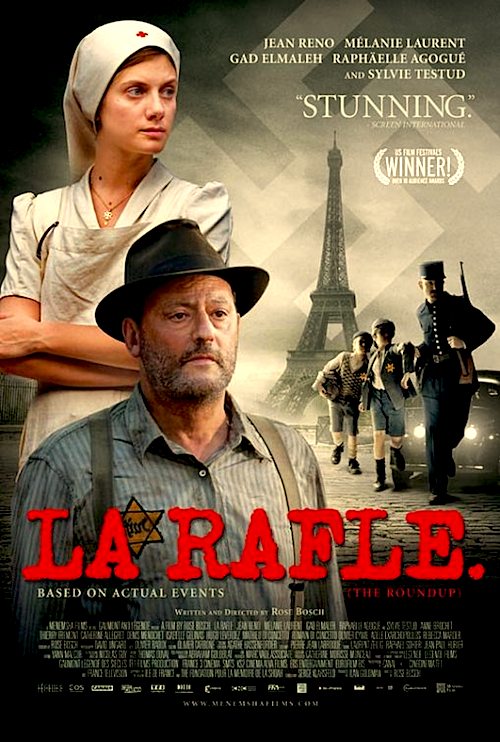By Joe Bendel. Conveniently, the infamous Winter Velodrome no longer stands in Paris. Yet, perversely, cycling races were still held in the venue as late as 1958, well after it served as a temporary holding facility for 13,000 Jewish Parisians, forcibly “rounded up” at the request of the occupying National Socialists. It was an episode of history France preferred to forget, since it was the Vichy authorities doing the rounding-up. While the actual event went scrupulously undocumented, Rose Bosch dramatizes the tragic events in La Rafle (The Round Up), which opens today in New York.
The fatality rate of those imprisoned in the Velodrome was nearly one hundred percent. Viewers will have no illusions where the captives are ultimately headed, but those in the Velodrome held out hope their next accommodations would be better. We come to meet many of the roughly detained, including children like Joseph Weismann and his friends, the Zygler brothers. While they used to run free through the streets of Montmartre, the boys suddenly find themselves enduring the heat and inadequate water and sanitation of the Velodrome. Fellow prisoner Dr. David Sheinbaum is the sole extent of the medical treatment available until the arrival of solitary Protestant charity nurse Annette Monod.
 Based on years of research, Bosch takes pains to show both the good and bad sides of the French national character. While the Weismann’s anti-Semitic neighbors cheer their deportation, the Parisian fire department reacts with shock and empathy, struggling to improve conditions in the Velodrome, against the gendarmerie’s express wishes.
Based on years of research, Bosch takes pains to show both the good and bad sides of the French national character. While the Weismann’s anti-Semitic neighbors cheer their deportation, the Parisian fire department reacts with shock and empathy, struggling to improve conditions in the Velodrome, against the gendarmerie’s express wishes.
Those who have seen Sarah’s Key or read the novel on which it is based will be familiar with the 1942 Roundup. Designer Olivier Raoux’s recreated Velodrome has the look and feel of a real life, slightly past its prime building, collapsing under the weight of its involuntary guests. Bosch’s scenes within its confines have a visceral you-are-there impact. However, the intermittent depictions of Hitler and the craven Petain lack the same power, only serving as a wan indictment of their banal evil.
In a bit of a surprise, it is Jean Reno who masterfully serves as the film’s moral center, portraying Dr. Sheinbaum with a profound spirit of world weary humanity. The impossible romantic tension that develops between him and Mélanie Laurent’s Monod is also deeply touching. That sense of “if only thing were different” palpably hangs in the air between them as they labor to ease the suffering around them as best they can.
Post-Schindler’s List, there have been a number of well-meaning dramas that have addressed the Holocaust, with varying degrees of success. La Rafle ranks as one of the more accomplished due to its technical merit and Reno’s assured, anchoring performance. Recommended for connoisseurs of French cinema and WWII films, it opens today (11/16) in New York at the Quad Cinema.
LFM GRADE: B
Posted on November 16th, 2012 at 10:38am.